Case Study: Cultural Influences on Diabetes Intervention in England
VerifiedAdded on 2023/06/09
|15
|5287
|221
Case Study
AI Summary
This case study examines the complex interplay between cultural practices and public health interventions for managing diabetes in children within England. The analysis begins by highlighting how cultural aspects, such as marriage customs and lifestyle choices, both support and hinder effective intervention strategies. It then delves into a dual evaluation approach, incorporating both qualitative and quantitative data to assess the intervention's impact. The study also explores the ethical considerations that arise from implementing these interventions, including issues related to access to care and potential discrimination. Furthermore, the case study evaluates the effectiveness and efficiency of various intervention methods, such as lifestyle changes and medication. The report also considers the social factors that affect the intervention and the perspective of the people. The conclusion summarizes the key findings, emphasizing the need for culturally sensitive and comprehensive approaches to diabetes management in children. The study also discusses the implications of ethical considerations, and the effectiveness and efficiency of the interventions.

CASE STUDY
Paraphrase This Document
Need a fresh take? Get an instant paraphrase of this document with our AI Paraphraser
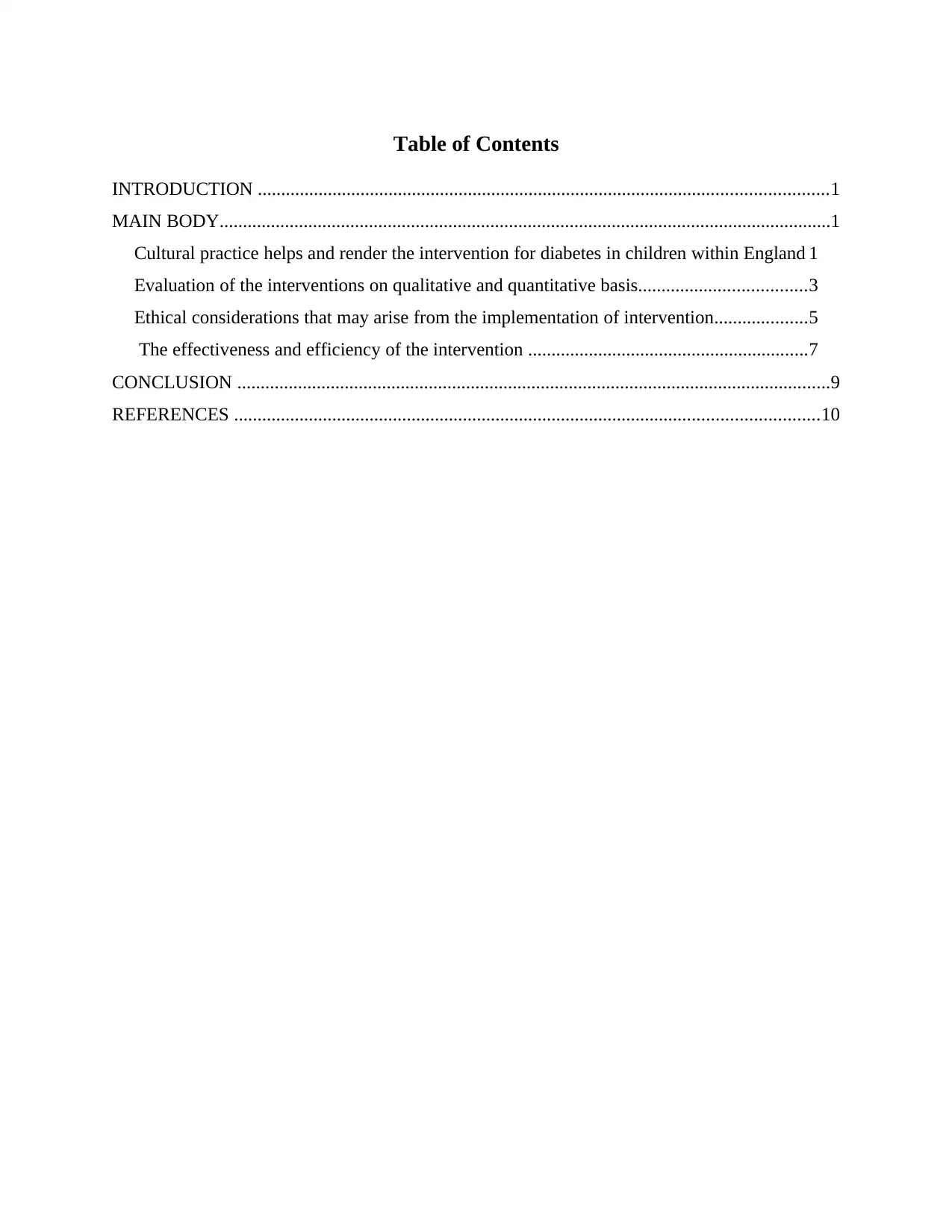
Table of Contents
INTRODUCTION ..........................................................................................................................1
MAIN BODY...................................................................................................................................1
Cultural practice helps and render the intervention for diabetes in children within England 1
Evaluation of the interventions on qualitative and quantitative basis....................................3
Ethical considerations that may arise from the implementation of intervention....................5
The effectiveness and efficiency of the intervention ............................................................7
CONCLUSION ...............................................................................................................................9
REFERENCES .............................................................................................................................10
INTRODUCTION ..........................................................................................................................1
MAIN BODY...................................................................................................................................1
Cultural practice helps and render the intervention for diabetes in children within England 1
Evaluation of the interventions on qualitative and quantitative basis....................................3
Ethical considerations that may arise from the implementation of intervention....................5
The effectiveness and efficiency of the intervention ............................................................7
CONCLUSION ...............................................................................................................................9
REFERENCES .............................................................................................................................10
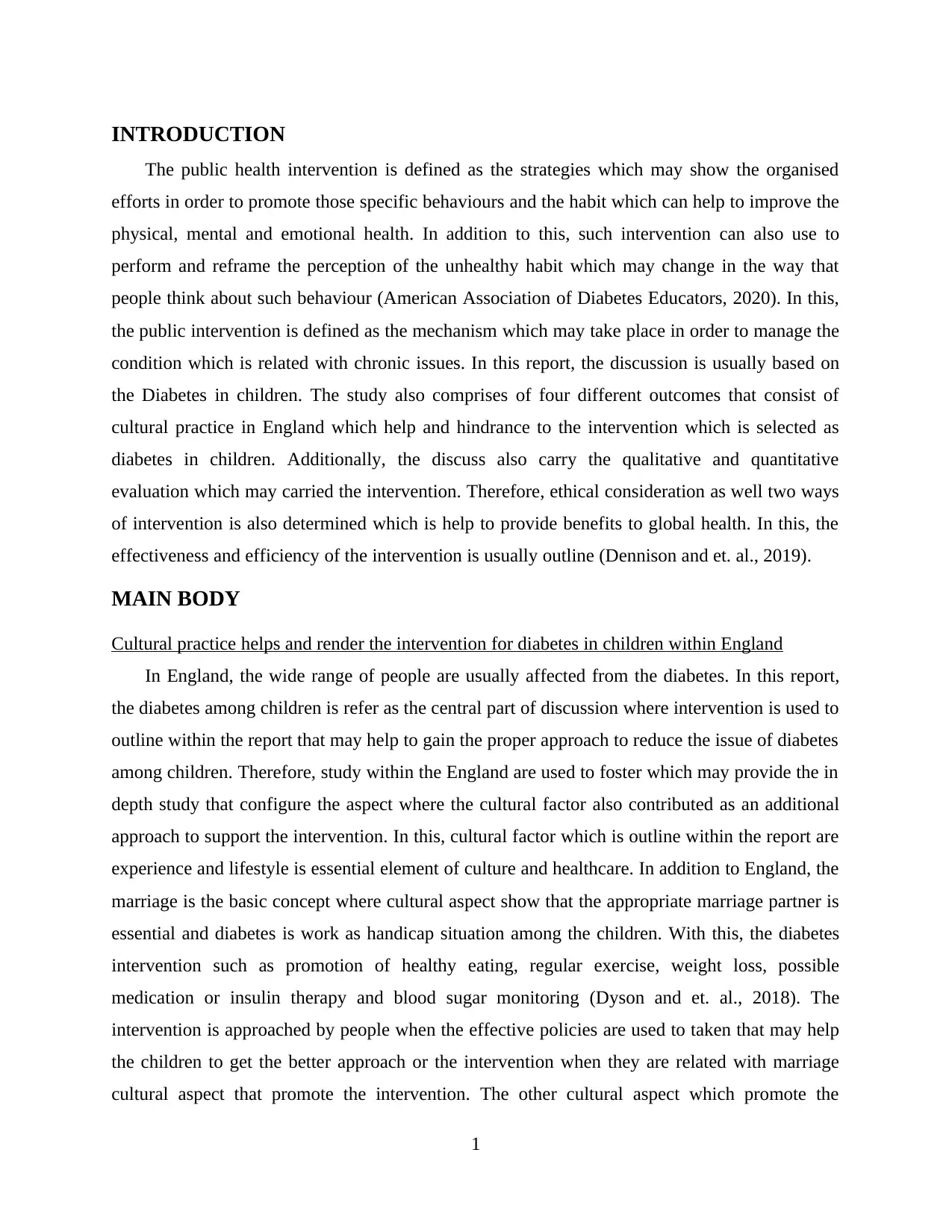
INTRODUCTION
The public health intervention is defined as the strategies which may show the organised
efforts in order to promote those specific behaviours and the habit which can help to improve the
physical, mental and emotional health. In addition to this, such intervention can also use to
perform and reframe the perception of the unhealthy habit which may change in the way that
people think about such behaviour (American Association of Diabetes Educators, 2020). In this,
the public intervention is defined as the mechanism which may take place in order to manage the
condition which is related with chronic issues. In this report, the discussion is usually based on
the Diabetes in children. The study also comprises of four different outcomes that consist of
cultural practice in England which help and hindrance to the intervention which is selected as
diabetes in children. Additionally, the discuss also carry the qualitative and quantitative
evaluation which may carried the intervention. Therefore, ethical consideration as well two ways
of intervention is also determined which is help to provide benefits to global health. In this, the
effectiveness and efficiency of the intervention is usually outline (Dennison and et. al., 2019).
MAIN BODY
Cultural practice helps and render the intervention for diabetes in children within England
In England, the wide range of people are usually affected from the diabetes. In this report,
the diabetes among children is refer as the central part of discussion where intervention is used to
outline within the report that may help to gain the proper approach to reduce the issue of diabetes
among children. Therefore, study within the England are used to foster which may provide the in
depth study that configure the aspect where the cultural factor also contributed as an additional
approach to support the intervention. In this, cultural factor which is outline within the report are
experience and lifestyle is essential element of culture and healthcare. In addition to England, the
marriage is the basic concept where cultural aspect show that the appropriate marriage partner is
essential and diabetes is work as handicap situation among the children. With this, the diabetes
intervention such as promotion of healthy eating, regular exercise, weight loss, possible
medication or insulin therapy and blood sugar monitoring (Dyson and et. al., 2018). The
intervention is approached by people when the effective policies are used to taken that may help
the children to get the better approach or the intervention when they are related with marriage
cultural aspect that promote the intervention. The other cultural aspect which promote the
1
The public health intervention is defined as the strategies which may show the organised
efforts in order to promote those specific behaviours and the habit which can help to improve the
physical, mental and emotional health. In addition to this, such intervention can also use to
perform and reframe the perception of the unhealthy habit which may change in the way that
people think about such behaviour (American Association of Diabetes Educators, 2020). In this,
the public intervention is defined as the mechanism which may take place in order to manage the
condition which is related with chronic issues. In this report, the discussion is usually based on
the Diabetes in children. The study also comprises of four different outcomes that consist of
cultural practice in England which help and hindrance to the intervention which is selected as
diabetes in children. Additionally, the discuss also carry the qualitative and quantitative
evaluation which may carried the intervention. Therefore, ethical consideration as well two ways
of intervention is also determined which is help to provide benefits to global health. In this, the
effectiveness and efficiency of the intervention is usually outline (Dennison and et. al., 2019).
MAIN BODY
Cultural practice helps and render the intervention for diabetes in children within England
In England, the wide range of people are usually affected from the diabetes. In this report,
the diabetes among children is refer as the central part of discussion where intervention is used to
outline within the report that may help to gain the proper approach to reduce the issue of diabetes
among children. Therefore, study within the England are used to foster which may provide the in
depth study that configure the aspect where the cultural factor also contributed as an additional
approach to support the intervention. In this, cultural factor which is outline within the report are
experience and lifestyle is essential element of culture and healthcare. In addition to England, the
marriage is the basic concept where cultural aspect show that the appropriate marriage partner is
essential and diabetes is work as handicap situation among the children. With this, the diabetes
intervention such as promotion of healthy eating, regular exercise, weight loss, possible
medication or insulin therapy and blood sugar monitoring (Dyson and et. al., 2018). The
intervention is approached by people when the effective policies are used to taken that may help
the children to get the better approach or the intervention when they are related with marriage
cultural aspect that promote the intervention. The other cultural aspect which promote the
1
⊘ This is a preview!⊘
Do you want full access?
Subscribe today to unlock all pages.

Trusted by 1+ million students worldwide
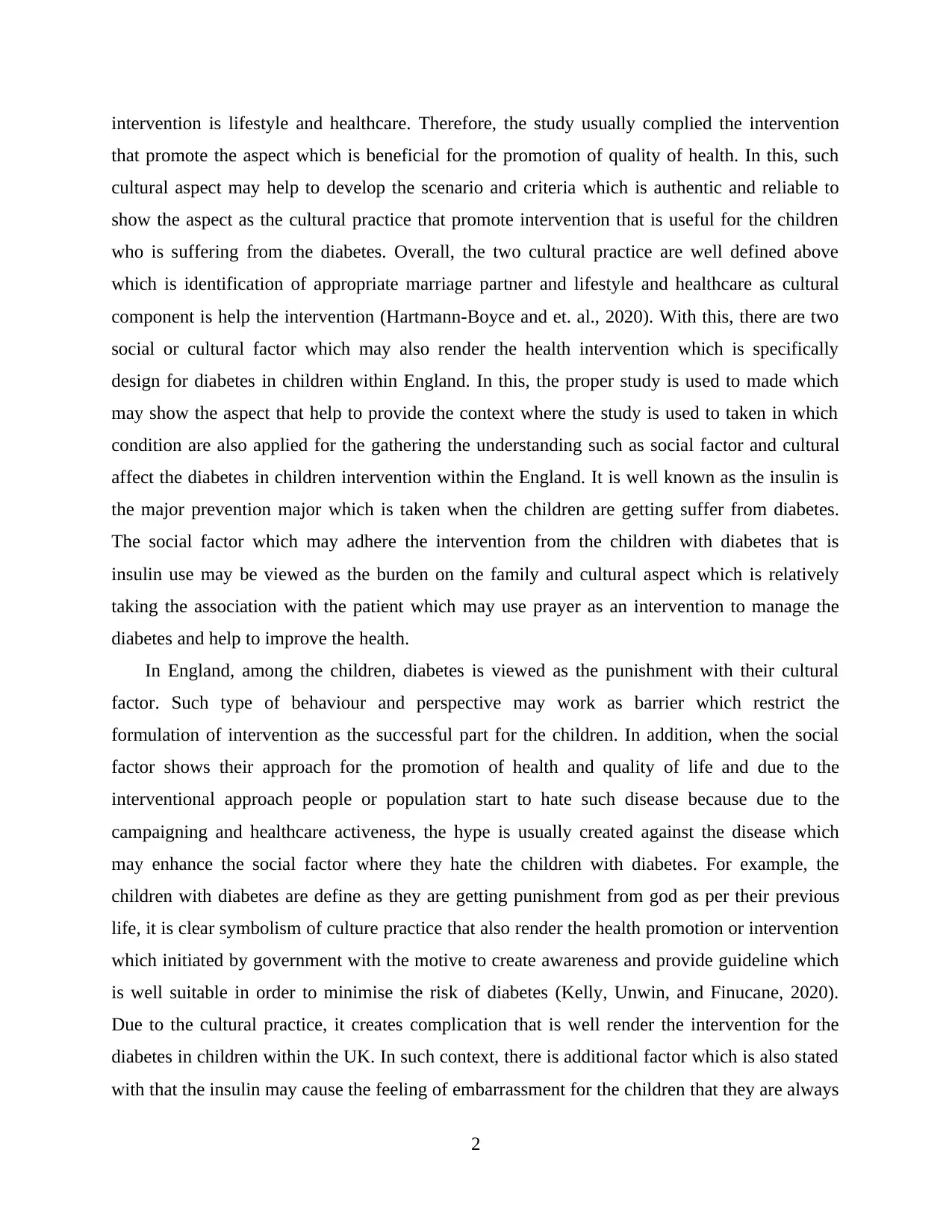
intervention is lifestyle and healthcare. Therefore, the study usually complied the intervention
that promote the aspect which is beneficial for the promotion of quality of health. In this, such
cultural aspect may help to develop the scenario and criteria which is authentic and reliable to
show the aspect as the cultural practice that promote intervention that is useful for the children
who is suffering from the diabetes. Overall, the two cultural practice are well defined above
which is identification of appropriate marriage partner and lifestyle and healthcare as cultural
component is help the intervention (Hartmann-Boyce and et. al., 2020). With this, there are two
social or cultural factor which may also render the health intervention which is specifically
design for diabetes in children within England. In this, the proper study is used to made which
may show the aspect that help to provide the context where the study is used to taken in which
condition are also applied for the gathering the understanding such as social factor and cultural
affect the diabetes in children intervention within the England. It is well known as the insulin is
the major prevention major which is taken when the children are getting suffer from diabetes.
The social factor which may adhere the intervention from the children with diabetes that is
insulin use may be viewed as the burden on the family and cultural aspect which is relatively
taking the association with the patient which may use prayer as an intervention to manage the
diabetes and help to improve the health.
In England, among the children, diabetes is viewed as the punishment with their cultural
factor. Such type of behaviour and perspective may work as barrier which restrict the
formulation of intervention as the successful part for the children. In addition, when the social
factor shows their approach for the promotion of health and quality of life and due to the
interventional approach people or population start to hate such disease because due to the
campaigning and healthcare activeness, the hype is usually created against the disease which
may enhance the social factor where they hate the children with diabetes. For example, the
children with diabetes are define as they are getting punishment from god as per their previous
life, it is clear symbolism of culture practice that also render the health promotion or intervention
which initiated by government with the motive to create awareness and provide guideline which
is well suitable in order to minimise the risk of diabetes (Kelly, Unwin, and Finucane, 2020).
Due to the cultural practice, it creates complication that is well render the intervention for the
diabetes in children within the UK. In such context, there is additional factor which is also stated
with that the insulin may cause the feeling of embarrassment for the children that they are always
2
that promote the aspect which is beneficial for the promotion of quality of health. In this, such
cultural aspect may help to develop the scenario and criteria which is authentic and reliable to
show the aspect as the cultural practice that promote intervention that is useful for the children
who is suffering from the diabetes. Overall, the two cultural practice are well defined above
which is identification of appropriate marriage partner and lifestyle and healthcare as cultural
component is help the intervention (Hartmann-Boyce and et. al., 2020). With this, there are two
social or cultural factor which may also render the health intervention which is specifically
design for diabetes in children within England. In this, the proper study is used to made which
may show the aspect that help to provide the context where the study is used to taken in which
condition are also applied for the gathering the understanding such as social factor and cultural
affect the diabetes in children intervention within the England. It is well known as the insulin is
the major prevention major which is taken when the children are getting suffer from diabetes.
The social factor which may adhere the intervention from the children with diabetes that is
insulin use may be viewed as the burden on the family and cultural aspect which is relatively
taking the association with the patient which may use prayer as an intervention to manage the
diabetes and help to improve the health.
In England, among the children, diabetes is viewed as the punishment with their cultural
factor. Such type of behaviour and perspective may work as barrier which restrict the
formulation of intervention as the successful part for the children. In addition, when the social
factor shows their approach for the promotion of health and quality of life and due to the
interventional approach people or population start to hate such disease because due to the
campaigning and healthcare activeness, the hype is usually created against the disease which
may enhance the social factor where they hate the children with diabetes. For example, the
children with diabetes are define as they are getting punishment from god as per their previous
life, it is clear symbolism of culture practice that also render the health promotion or intervention
which initiated by government with the motive to create awareness and provide guideline which
is well suitable in order to minimise the risk of diabetes (Kelly, Unwin, and Finucane, 2020).
Due to the cultural practice, it creates complication that is well render the intervention for the
diabetes in children within the UK. In such context, there is additional factor which is also stated
with that the insulin may cause the feeling of embarrassment for the children that they are always
2
Paraphrase This Document
Need a fresh take? Get an instant paraphrase of this document with our AI Paraphraser
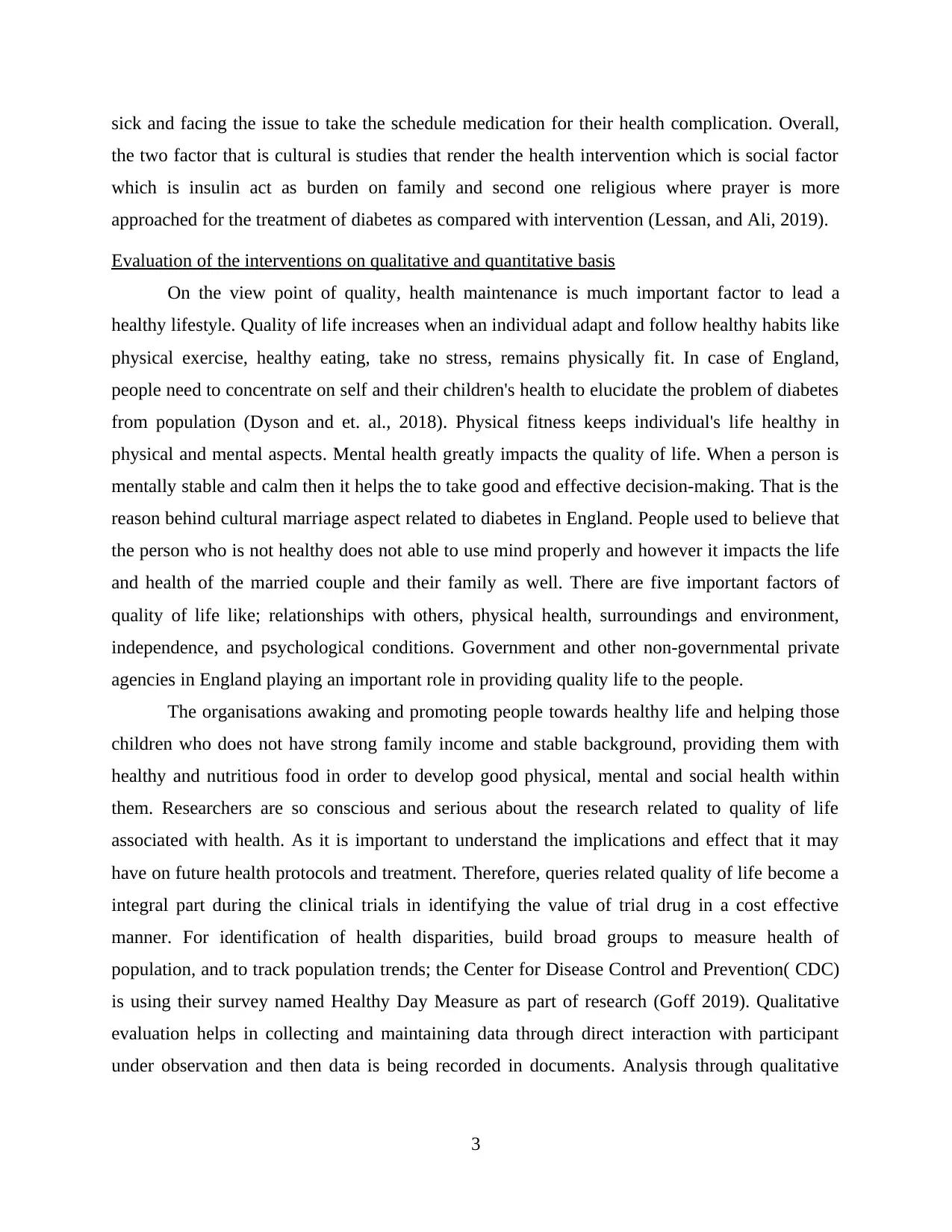
sick and facing the issue to take the schedule medication for their health complication. Overall,
the two factor that is cultural is studies that render the health intervention which is social factor
which is insulin act as burden on family and second one religious where prayer is more
approached for the treatment of diabetes as compared with intervention (Lessan, and Ali, 2019).
Evaluation of the interventions on qualitative and quantitative basis
On the view point of quality, health maintenance is much important factor to lead a
healthy lifestyle. Quality of life increases when an individual adapt and follow healthy habits like
physical exercise, healthy eating, take no stress, remains physically fit. In case of England,
people need to concentrate on self and their children's health to elucidate the problem of diabetes
from population (Dyson and et. al., 2018). Physical fitness keeps individual's life healthy in
physical and mental aspects. Mental health greatly impacts the quality of life. When a person is
mentally stable and calm then it helps the to take good and effective decision-making. That is the
reason behind cultural marriage aspect related to diabetes in England. People used to believe that
the person who is not healthy does not able to use mind properly and however it impacts the life
and health of the married couple and their family as well. There are five important factors of
quality of life like; relationships with others, physical health, surroundings and environment,
independence, and psychological conditions. Government and other non-governmental private
agencies in England playing an important role in providing quality life to the people.
The organisations awaking and promoting people towards healthy life and helping those
children who does not have strong family income and stable background, providing them with
healthy and nutritious food in order to develop good physical, mental and social health within
them. Researchers are so conscious and serious about the research related to quality of life
associated with health. As it is important to understand the implications and effect that it may
have on future health protocols and treatment. Therefore, queries related quality of life become a
integral part during the clinical trials in identifying the value of trial drug in a cost effective
manner. For identification of health disparities, build broad groups to measure health of
population, and to track population trends; the Center for Disease Control and Prevention( CDC)
is using their survey named Healthy Day Measure as part of research (Goff 2019). Qualitative
evaluation helps in collecting and maintaining data through direct interaction with participant
under observation and then data is being recorded in documents. Analysis through qualitative
3
the two factor that is cultural is studies that render the health intervention which is social factor
which is insulin act as burden on family and second one religious where prayer is more
approached for the treatment of diabetes as compared with intervention (Lessan, and Ali, 2019).
Evaluation of the interventions on qualitative and quantitative basis
On the view point of quality, health maintenance is much important factor to lead a
healthy lifestyle. Quality of life increases when an individual adapt and follow healthy habits like
physical exercise, healthy eating, take no stress, remains physically fit. In case of England,
people need to concentrate on self and their children's health to elucidate the problem of diabetes
from population (Dyson and et. al., 2018). Physical fitness keeps individual's life healthy in
physical and mental aspects. Mental health greatly impacts the quality of life. When a person is
mentally stable and calm then it helps the to take good and effective decision-making. That is the
reason behind cultural marriage aspect related to diabetes in England. People used to believe that
the person who is not healthy does not able to use mind properly and however it impacts the life
and health of the married couple and their family as well. There are five important factors of
quality of life like; relationships with others, physical health, surroundings and environment,
independence, and psychological conditions. Government and other non-governmental private
agencies in England playing an important role in providing quality life to the people.
The organisations awaking and promoting people towards healthy life and helping those
children who does not have strong family income and stable background, providing them with
healthy and nutritious food in order to develop good physical, mental and social health within
them. Researchers are so conscious and serious about the research related to quality of life
associated with health. As it is important to understand the implications and effect that it may
have on future health protocols and treatment. Therefore, queries related quality of life become a
integral part during the clinical trials in identifying the value of trial drug in a cost effective
manner. For identification of health disparities, build broad groups to measure health of
population, and to track population trends; the Center for Disease Control and Prevention( CDC)
is using their survey named Healthy Day Measure as part of research (Goff 2019). Qualitative
evaluation helps in collecting and maintaining data through direct interaction with participant
under observation and then data is being recorded in documents. Analysis through qualitative
3
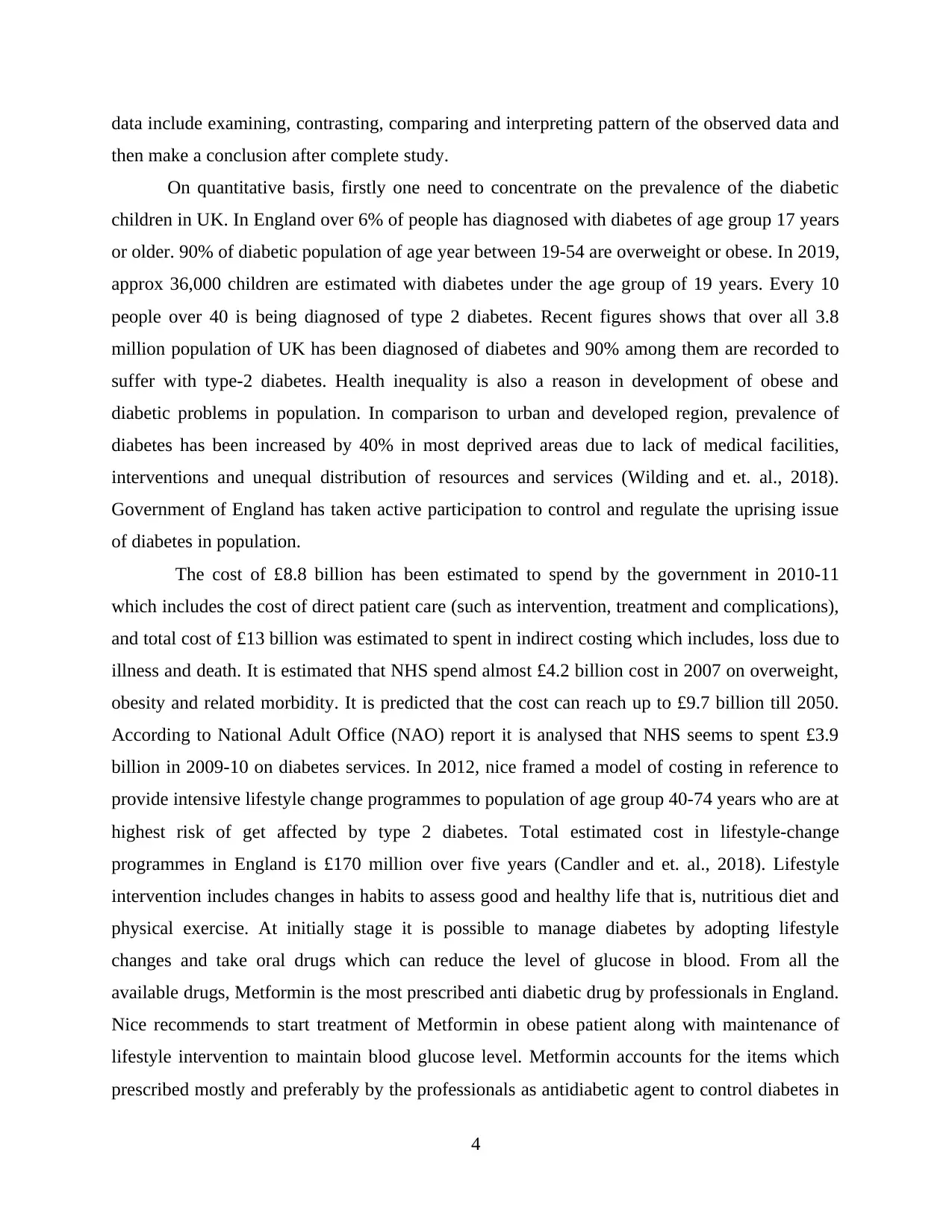
data include examining, contrasting, comparing and interpreting pattern of the observed data and
then make a conclusion after complete study.
On quantitative basis, firstly one need to concentrate on the prevalence of the diabetic
children in UK. In England over 6% of people has diagnosed with diabetes of age group 17 years
or older. 90% of diabetic population of age year between 19-54 are overweight or obese. In 2019,
approx 36,000 children are estimated with diabetes under the age group of 19 years. Every 10
people over 40 is being diagnosed of type 2 diabetes. Recent figures shows that over all 3.8
million population of UK has been diagnosed of diabetes and 90% among them are recorded to
suffer with type-2 diabetes. Health inequality is also a reason in development of obese and
diabetic problems in population. In comparison to urban and developed region, prevalence of
diabetes has been increased by 40% in most deprived areas due to lack of medical facilities,
interventions and unequal distribution of resources and services (Wilding and et. al., 2018).
Government of England has taken active participation to control and regulate the uprising issue
of diabetes in population.
The cost of £8.8 billion has been estimated to spend by the government in 2010-11
which includes the cost of direct patient care (such as intervention, treatment and complications),
and total cost of £13 billion was estimated to spent in indirect costing which includes, loss due to
illness and death. It is estimated that NHS spend almost £4.2 billion cost in 2007 on overweight,
obesity and related morbidity. It is predicted that the cost can reach up to £9.7 billion till 2050.
According to National Adult Office (NAO) report it is analysed that NHS seems to spent £3.9
billion in 2009-10 on diabetes services. In 2012, nice framed a model of costing in reference to
provide intensive lifestyle change programmes to population of age group 40-74 years who are at
highest risk of get affected by type 2 diabetes. Total estimated cost in lifestyle-change
programmes in England is £170 million over five years (Candler and et. al., 2018). Lifestyle
intervention includes changes in habits to assess good and healthy life that is, nutritious diet and
physical exercise. At initially stage it is possible to manage diabetes by adopting lifestyle
changes and take oral drugs which can reduce the level of glucose in blood. From all the
available drugs, Metformin is the most prescribed anti diabetic drug by professionals in England.
Nice recommends to start treatment of Metformin in obese patient along with maintenance of
lifestyle intervention to maintain blood glucose level. Metformin accounts for the items which
prescribed mostly and preferably by the professionals as antidiabetic agent to control diabetes in
4
then make a conclusion after complete study.
On quantitative basis, firstly one need to concentrate on the prevalence of the diabetic
children in UK. In England over 6% of people has diagnosed with diabetes of age group 17 years
or older. 90% of diabetic population of age year between 19-54 are overweight or obese. In 2019,
approx 36,000 children are estimated with diabetes under the age group of 19 years. Every 10
people over 40 is being diagnosed of type 2 diabetes. Recent figures shows that over all 3.8
million population of UK has been diagnosed of diabetes and 90% among them are recorded to
suffer with type-2 diabetes. Health inequality is also a reason in development of obese and
diabetic problems in population. In comparison to urban and developed region, prevalence of
diabetes has been increased by 40% in most deprived areas due to lack of medical facilities,
interventions and unequal distribution of resources and services (Wilding and et. al., 2018).
Government of England has taken active participation to control and regulate the uprising issue
of diabetes in population.
The cost of £8.8 billion has been estimated to spend by the government in 2010-11
which includes the cost of direct patient care (such as intervention, treatment and complications),
and total cost of £13 billion was estimated to spent in indirect costing which includes, loss due to
illness and death. It is estimated that NHS spend almost £4.2 billion cost in 2007 on overweight,
obesity and related morbidity. It is predicted that the cost can reach up to £9.7 billion till 2050.
According to National Adult Office (NAO) report it is analysed that NHS seems to spent £3.9
billion in 2009-10 on diabetes services. In 2012, nice framed a model of costing in reference to
provide intensive lifestyle change programmes to population of age group 40-74 years who are at
highest risk of get affected by type 2 diabetes. Total estimated cost in lifestyle-change
programmes in England is £170 million over five years (Candler and et. al., 2018). Lifestyle
intervention includes changes in habits to assess good and healthy life that is, nutritious diet and
physical exercise. At initially stage it is possible to manage diabetes by adopting lifestyle
changes and take oral drugs which can reduce the level of glucose in blood. From all the
available drugs, Metformin is the most prescribed anti diabetic drug by professionals in England.
Nice recommends to start treatment of Metformin in obese patient along with maintenance of
lifestyle intervention to maintain blood glucose level. Metformin accounts for the items which
prescribed mostly and preferably by the professionals as antidiabetic agent to control diabetes in
4
⊘ This is a preview!⊘
Do you want full access?
Subscribe today to unlock all pages.

Trusted by 1+ million students worldwide
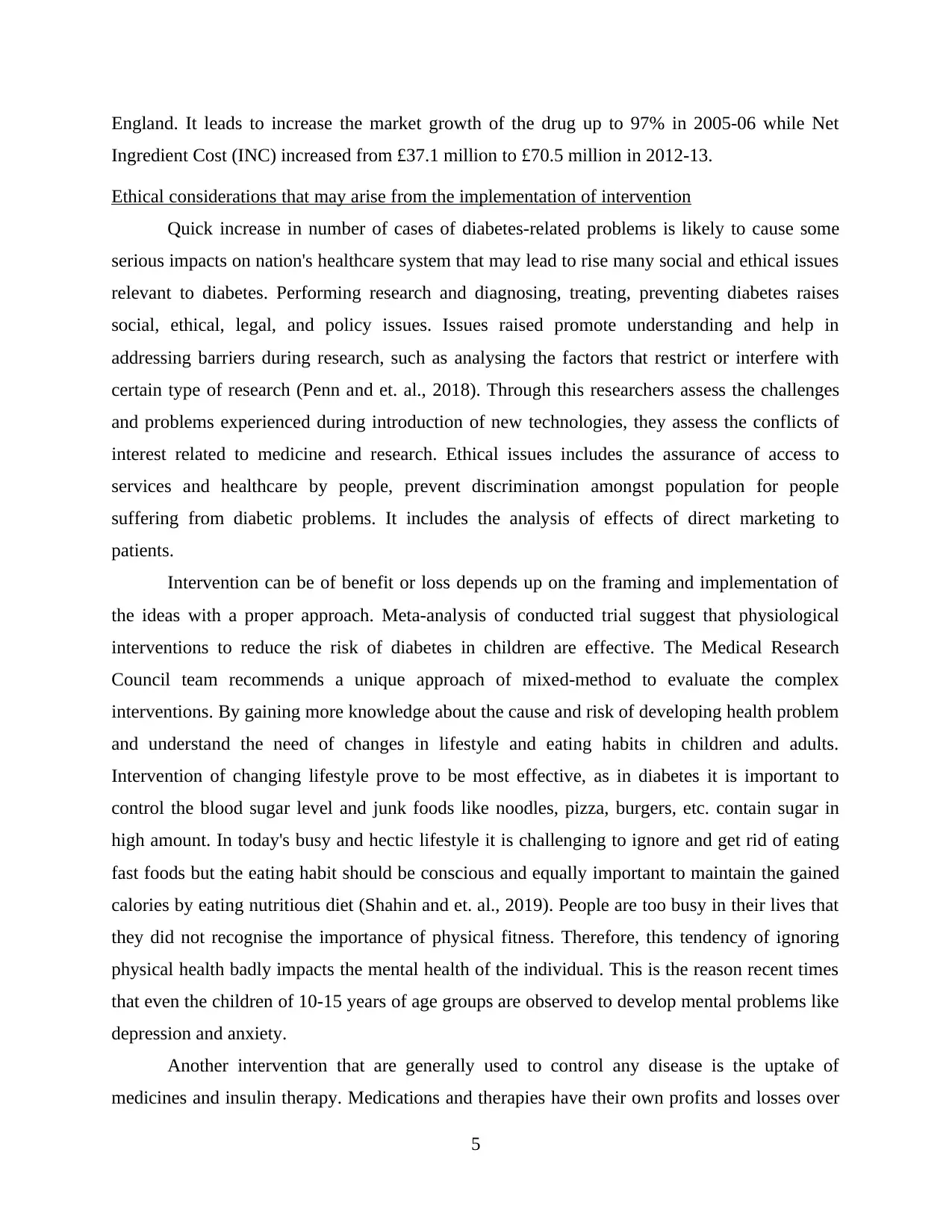
England. It leads to increase the market growth of the drug up to 97% in 2005-06 while Net
Ingredient Cost (INC) increased from £37.1 million to £70.5 million in 2012-13.
Ethical considerations that may arise from the implementation of intervention
Quick increase in number of cases of diabetes-related problems is likely to cause some
serious impacts on nation's healthcare system that may lead to rise many social and ethical issues
relevant to diabetes. Performing research and diagnosing, treating, preventing diabetes raises
social, ethical, legal, and policy issues. Issues raised promote understanding and help in
addressing barriers during research, such as analysing the factors that restrict or interfere with
certain type of research (Penn and et. al., 2018). Through this researchers assess the challenges
and problems experienced during introduction of new technologies, they assess the conflicts of
interest related to medicine and research. Ethical issues includes the assurance of access to
services and healthcare by people, prevent discrimination amongst population for people
suffering from diabetic problems. It includes the analysis of effects of direct marketing to
patients.
Intervention can be of benefit or loss depends up on the framing and implementation of
the ideas with a proper approach. Meta-analysis of conducted trial suggest that physiological
interventions to reduce the risk of diabetes in children are effective. The Medical Research
Council team recommends a unique approach of mixed-method to evaluate the complex
interventions. By gaining more knowledge about the cause and risk of developing health problem
and understand the need of changes in lifestyle and eating habits in children and adults.
Intervention of changing lifestyle prove to be most effective, as in diabetes it is important to
control the blood sugar level and junk foods like noodles, pizza, burgers, etc. contain sugar in
high amount. In today's busy and hectic lifestyle it is challenging to ignore and get rid of eating
fast foods but the eating habit should be conscious and equally important to maintain the gained
calories by eating nutritious diet (Shahin and et. al., 2019). People are too busy in their lives that
they did not recognise the importance of physical fitness. Therefore, this tendency of ignoring
physical health badly impacts the mental health of the individual. This is the reason recent times
that even the children of 10-15 years of age groups are observed to develop mental problems like
depression and anxiety.
Another intervention that are generally used to control any disease is the uptake of
medicines and insulin therapy. Medications and therapies have their own profits and losses over
5
Ingredient Cost (INC) increased from £37.1 million to £70.5 million in 2012-13.
Ethical considerations that may arise from the implementation of intervention
Quick increase in number of cases of diabetes-related problems is likely to cause some
serious impacts on nation's healthcare system that may lead to rise many social and ethical issues
relevant to diabetes. Performing research and diagnosing, treating, preventing diabetes raises
social, ethical, legal, and policy issues. Issues raised promote understanding and help in
addressing barriers during research, such as analysing the factors that restrict or interfere with
certain type of research (Penn and et. al., 2018). Through this researchers assess the challenges
and problems experienced during introduction of new technologies, they assess the conflicts of
interest related to medicine and research. Ethical issues includes the assurance of access to
services and healthcare by people, prevent discrimination amongst population for people
suffering from diabetic problems. It includes the analysis of effects of direct marketing to
patients.
Intervention can be of benefit or loss depends up on the framing and implementation of
the ideas with a proper approach. Meta-analysis of conducted trial suggest that physiological
interventions to reduce the risk of diabetes in children are effective. The Medical Research
Council team recommends a unique approach of mixed-method to evaluate the complex
interventions. By gaining more knowledge about the cause and risk of developing health problem
and understand the need of changes in lifestyle and eating habits in children and adults.
Intervention of changing lifestyle prove to be most effective, as in diabetes it is important to
control the blood sugar level and junk foods like noodles, pizza, burgers, etc. contain sugar in
high amount. In today's busy and hectic lifestyle it is challenging to ignore and get rid of eating
fast foods but the eating habit should be conscious and equally important to maintain the gained
calories by eating nutritious diet (Shahin and et. al., 2019). People are too busy in their lives that
they did not recognise the importance of physical fitness. Therefore, this tendency of ignoring
physical health badly impacts the mental health of the individual. This is the reason recent times
that even the children of 10-15 years of age groups are observed to develop mental problems like
depression and anxiety.
Another intervention that are generally used to control any disease is the uptake of
medicines and insulin therapy. Medications and therapies have their own profits and losses over
5
Paraphrase This Document
Need a fresh take? Get an instant paraphrase of this document with our AI Paraphraser
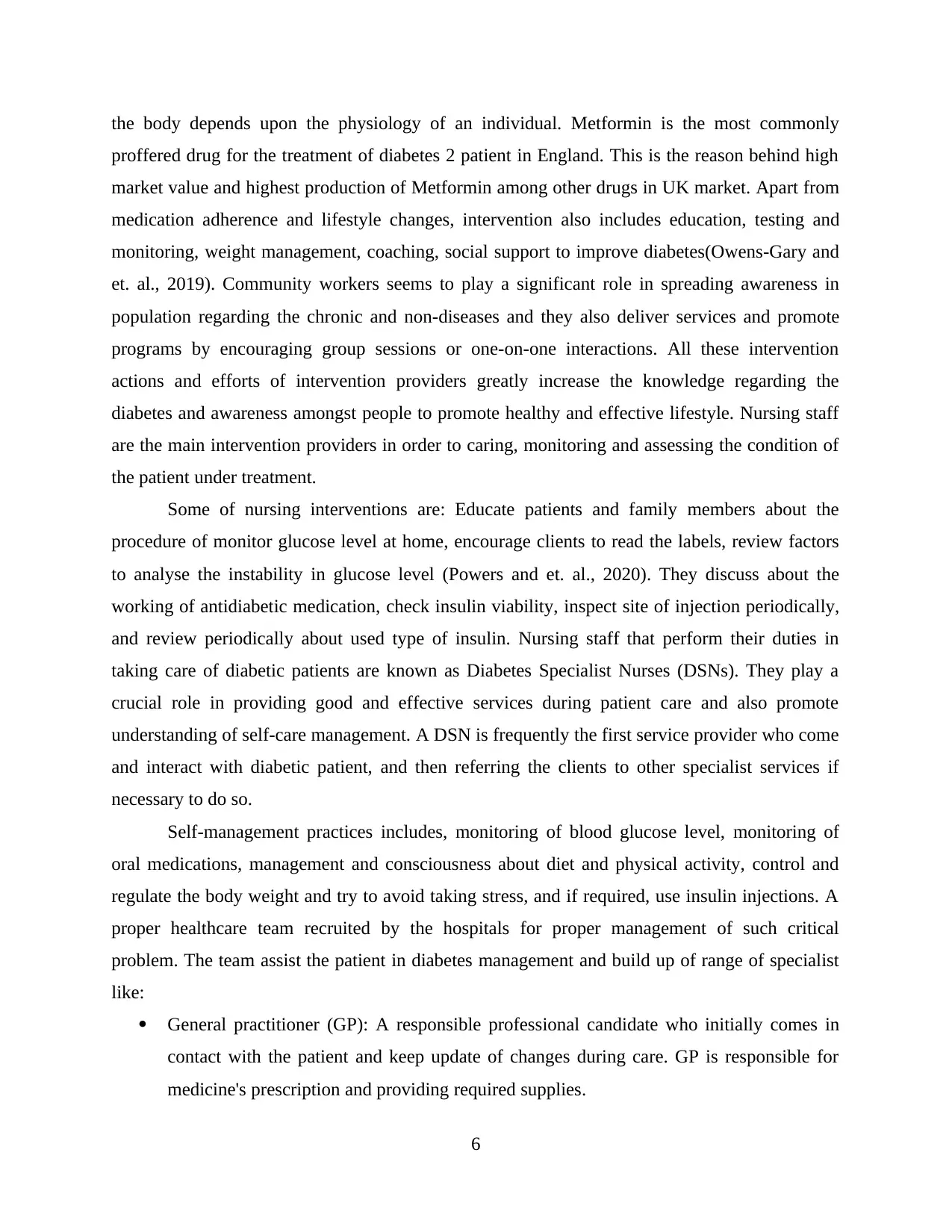
the body depends upon the physiology of an individual. Metformin is the most commonly
proffered drug for the treatment of diabetes 2 patient in England. This is the reason behind high
market value and highest production of Metformin among other drugs in UK market. Apart from
medication adherence and lifestyle changes, intervention also includes education, testing and
monitoring, weight management, coaching, social support to improve diabetes(Owens-Gary and
et. al., 2019). Community workers seems to play a significant role in spreading awareness in
population regarding the chronic and non-diseases and they also deliver services and promote
programs by encouraging group sessions or one-on-one interactions. All these intervention
actions and efforts of intervention providers greatly increase the knowledge regarding the
diabetes and awareness amongst people to promote healthy and effective lifestyle. Nursing staff
are the main intervention providers in order to caring, monitoring and assessing the condition of
the patient under treatment.
Some of nursing interventions are: Educate patients and family members about the
procedure of monitor glucose level at home, encourage clients to read the labels, review factors
to analyse the instability in glucose level (Powers and et. al., 2020). They discuss about the
working of antidiabetic medication, check insulin viability, inspect site of injection periodically,
and review periodically about used type of insulin. Nursing staff that perform their duties in
taking care of diabetic patients are known as Diabetes Specialist Nurses (DSNs). They play a
crucial role in providing good and effective services during patient care and also promote
understanding of self-care management. A DSN is frequently the first service provider who come
and interact with diabetic patient, and then referring the clients to other specialist services if
necessary to do so.
Self-management practices includes, monitoring of blood glucose level, monitoring of
oral medications, management and consciousness about diet and physical activity, control and
regulate the body weight and try to avoid taking stress, and if required, use insulin injections. A
proper healthcare team recruited by the hospitals for proper management of such critical
problem. The team assist the patient in diabetes management and build up of range of specialist
like:
General practitioner (GP): A responsible professional candidate who initially comes in
contact with the patient and keep update of changes during care. GP is responsible for
medicine's prescription and providing required supplies.
6
proffered drug for the treatment of diabetes 2 patient in England. This is the reason behind high
market value and highest production of Metformin among other drugs in UK market. Apart from
medication adherence and lifestyle changes, intervention also includes education, testing and
monitoring, weight management, coaching, social support to improve diabetes(Owens-Gary and
et. al., 2019). Community workers seems to play a significant role in spreading awareness in
population regarding the chronic and non-diseases and they also deliver services and promote
programs by encouraging group sessions or one-on-one interactions. All these intervention
actions and efforts of intervention providers greatly increase the knowledge regarding the
diabetes and awareness amongst people to promote healthy and effective lifestyle. Nursing staff
are the main intervention providers in order to caring, monitoring and assessing the condition of
the patient under treatment.
Some of nursing interventions are: Educate patients and family members about the
procedure of monitor glucose level at home, encourage clients to read the labels, review factors
to analyse the instability in glucose level (Powers and et. al., 2020). They discuss about the
working of antidiabetic medication, check insulin viability, inspect site of injection periodically,
and review periodically about used type of insulin. Nursing staff that perform their duties in
taking care of diabetic patients are known as Diabetes Specialist Nurses (DSNs). They play a
crucial role in providing good and effective services during patient care and also promote
understanding of self-care management. A DSN is frequently the first service provider who come
and interact with diabetic patient, and then referring the clients to other specialist services if
necessary to do so.
Self-management practices includes, monitoring of blood glucose level, monitoring of
oral medications, management and consciousness about diet and physical activity, control and
regulate the body weight and try to avoid taking stress, and if required, use insulin injections. A
proper healthcare team recruited by the hospitals for proper management of such critical
problem. The team assist the patient in diabetes management and build up of range of specialist
like:
General practitioner (GP): A responsible professional candidate who initially comes in
contact with the patient and keep update of changes during care. GP is responsible for
medicine's prescription and providing required supplies.
6
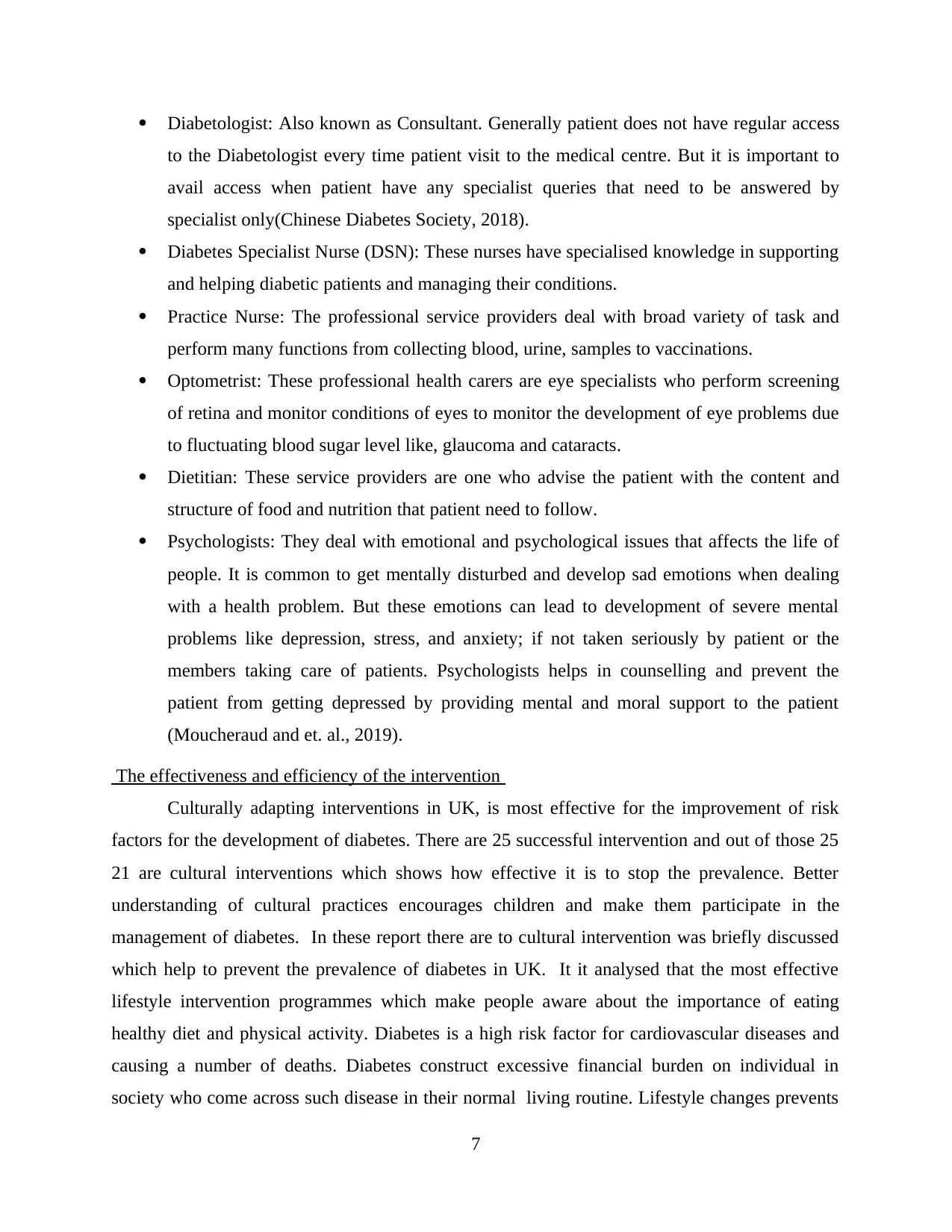
Diabetologist: Also known as Consultant. Generally patient does not have regular access
to the Diabetologist every time patient visit to the medical centre. But it is important to
avail access when patient have any specialist queries that need to be answered by
specialist only(Chinese Diabetes Society, 2018).
Diabetes Specialist Nurse (DSN): These nurses have specialised knowledge in supporting
and helping diabetic patients and managing their conditions.
Practice Nurse: The professional service providers deal with broad variety of task and
perform many functions from collecting blood, urine, samples to vaccinations.
Optometrist: These professional health carers are eye specialists who perform screening
of retina and monitor conditions of eyes to monitor the development of eye problems due
to fluctuating blood sugar level like, glaucoma and cataracts.
Dietitian: These service providers are one who advise the patient with the content and
structure of food and nutrition that patient need to follow.
Psychologists: They deal with emotional and psychological issues that affects the life of
people. It is common to get mentally disturbed and develop sad emotions when dealing
with a health problem. But these emotions can lead to development of severe mental
problems like depression, stress, and anxiety; if not taken seriously by patient or the
members taking care of patients. Psychologists helps in counselling and prevent the
patient from getting depressed by providing mental and moral support to the patient
(Moucheraud and et. al., 2019).
The effectiveness and efficiency of the intervention
Culturally adapting interventions in UK, is most effective for the improvement of risk
factors for the development of diabetes. There are 25 successful intervention and out of those 25
21 are cultural interventions which shows how effective it is to stop the prevalence. Better
understanding of cultural practices encourages children and make them participate in the
management of diabetes. In these report there are to cultural intervention was briefly discussed
which help to prevent the prevalence of diabetes in UK. It it analysed that the most effective
lifestyle intervention programmes which make people aware about the importance of eating
healthy diet and physical activity. Diabetes is a high risk factor for cardiovascular diseases and
causing a number of deaths. Diabetes construct excessive financial burden on individual in
society who come across such disease in their normal living routine. Lifestyle changes prevents
7
to the Diabetologist every time patient visit to the medical centre. But it is important to
avail access when patient have any specialist queries that need to be answered by
specialist only(Chinese Diabetes Society, 2018).
Diabetes Specialist Nurse (DSN): These nurses have specialised knowledge in supporting
and helping diabetic patients and managing their conditions.
Practice Nurse: The professional service providers deal with broad variety of task and
perform many functions from collecting blood, urine, samples to vaccinations.
Optometrist: These professional health carers are eye specialists who perform screening
of retina and monitor conditions of eyes to monitor the development of eye problems due
to fluctuating blood sugar level like, glaucoma and cataracts.
Dietitian: These service providers are one who advise the patient with the content and
structure of food and nutrition that patient need to follow.
Psychologists: They deal with emotional and psychological issues that affects the life of
people. It is common to get mentally disturbed and develop sad emotions when dealing
with a health problem. But these emotions can lead to development of severe mental
problems like depression, stress, and anxiety; if not taken seriously by patient or the
members taking care of patients. Psychologists helps in counselling and prevent the
patient from getting depressed by providing mental and moral support to the patient
(Moucheraud and et. al., 2019).
The effectiveness and efficiency of the intervention
Culturally adapting interventions in UK, is most effective for the improvement of risk
factors for the development of diabetes. There are 25 successful intervention and out of those 25
21 are cultural interventions which shows how effective it is to stop the prevalence. Better
understanding of cultural practices encourages children and make them participate in the
management of diabetes. In these report there are to cultural intervention was briefly discussed
which help to prevent the prevalence of diabetes in UK. It it analysed that the most effective
lifestyle intervention programmes which make people aware about the importance of eating
healthy diet and physical activity. Diabetes is a high risk factor for cardiovascular diseases and
causing a number of deaths. Diabetes construct excessive financial burden on individual in
society who come across such disease in their normal living routine. Lifestyle changes prevents
7
⊘ This is a preview!⊘
Do you want full access?
Subscribe today to unlock all pages.

Trusted by 1+ million students worldwide
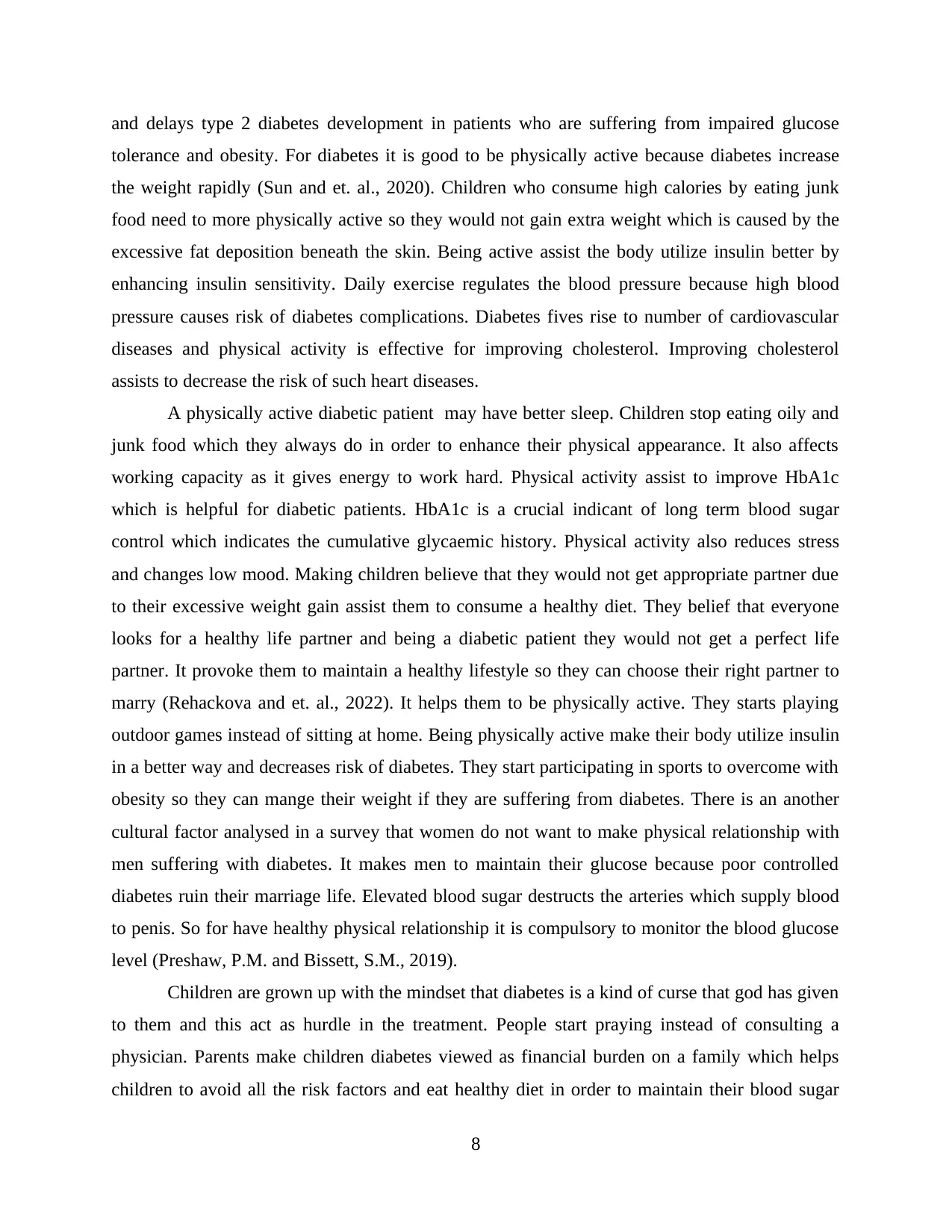
and delays type 2 diabetes development in patients who are suffering from impaired glucose
tolerance and obesity. For diabetes it is good to be physically active because diabetes increase
the weight rapidly (Sun and et. al., 2020). Children who consume high calories by eating junk
food need to more physically active so they would not gain extra weight which is caused by the
excessive fat deposition beneath the skin. Being active assist the body utilize insulin better by
enhancing insulin sensitivity. Daily exercise regulates the blood pressure because high blood
pressure causes risk of diabetes complications. Diabetes fives rise to number of cardiovascular
diseases and physical activity is effective for improving cholesterol. Improving cholesterol
assists to decrease the risk of such heart diseases.
A physically active diabetic patient may have better sleep. Children stop eating oily and
junk food which they always do in order to enhance their physical appearance. It also affects
working capacity as it gives energy to work hard. Physical activity assist to improve HbA1c
which is helpful for diabetic patients. HbA1c is a crucial indicant of long term blood sugar
control which indicates the cumulative glycaemic history. Physical activity also reduces stress
and changes low mood. Making children believe that they would not get appropriate partner due
to their excessive weight gain assist them to consume a healthy diet. They belief that everyone
looks for a healthy life partner and being a diabetic patient they would not get a perfect life
partner. It provoke them to maintain a healthy lifestyle so they can choose their right partner to
marry (Rehackova and et. al., 2022). It helps them to be physically active. They starts playing
outdoor games instead of sitting at home. Being physically active make their body utilize insulin
in a better way and decreases risk of diabetes. They start participating in sports to overcome with
obesity so they can mange their weight if they are suffering from diabetes. There is an another
cultural factor analysed in a survey that women do not want to make physical relationship with
men suffering with diabetes. It makes men to maintain their glucose because poor controlled
diabetes ruin their marriage life. Elevated blood sugar destructs the arteries which supply blood
to penis. So for have healthy physical relationship it is compulsory to monitor the blood glucose
level (Preshaw, P.M. and Bissett, S.M., 2019).
Children are grown up with the mindset that diabetes is a kind of curse that god has given
to them and this act as hurdle in the treatment. People start praying instead of consulting a
physician. Parents make children diabetes viewed as financial burden on a family which helps
children to avoid all the risk factors and eat healthy diet in order to maintain their blood sugar
8
tolerance and obesity. For diabetes it is good to be physically active because diabetes increase
the weight rapidly (Sun and et. al., 2020). Children who consume high calories by eating junk
food need to more physically active so they would not gain extra weight which is caused by the
excessive fat deposition beneath the skin. Being active assist the body utilize insulin better by
enhancing insulin sensitivity. Daily exercise regulates the blood pressure because high blood
pressure causes risk of diabetes complications. Diabetes fives rise to number of cardiovascular
diseases and physical activity is effective for improving cholesterol. Improving cholesterol
assists to decrease the risk of such heart diseases.
A physically active diabetic patient may have better sleep. Children stop eating oily and
junk food which they always do in order to enhance their physical appearance. It also affects
working capacity as it gives energy to work hard. Physical activity assist to improve HbA1c
which is helpful for diabetic patients. HbA1c is a crucial indicant of long term blood sugar
control which indicates the cumulative glycaemic history. Physical activity also reduces stress
and changes low mood. Making children believe that they would not get appropriate partner due
to their excessive weight gain assist them to consume a healthy diet. They belief that everyone
looks for a healthy life partner and being a diabetic patient they would not get a perfect life
partner. It provoke them to maintain a healthy lifestyle so they can choose their right partner to
marry (Rehackova and et. al., 2022). It helps them to be physically active. They starts playing
outdoor games instead of sitting at home. Being physically active make their body utilize insulin
in a better way and decreases risk of diabetes. They start participating in sports to overcome with
obesity so they can mange their weight if they are suffering from diabetes. There is an another
cultural factor analysed in a survey that women do not want to make physical relationship with
men suffering with diabetes. It makes men to maintain their glucose because poor controlled
diabetes ruin their marriage life. Elevated blood sugar destructs the arteries which supply blood
to penis. So for have healthy physical relationship it is compulsory to monitor the blood glucose
level (Preshaw, P.M. and Bissett, S.M., 2019).
Children are grown up with the mindset that diabetes is a kind of curse that god has given
to them and this act as hurdle in the treatment. People start praying instead of consulting a
physician. Parents make children diabetes viewed as financial burden on a family which helps
children to avoid all the risk factors and eat healthy diet in order to maintain their blood sugar
8
Paraphrase This Document
Need a fresh take? Get an instant paraphrase of this document with our AI Paraphraser
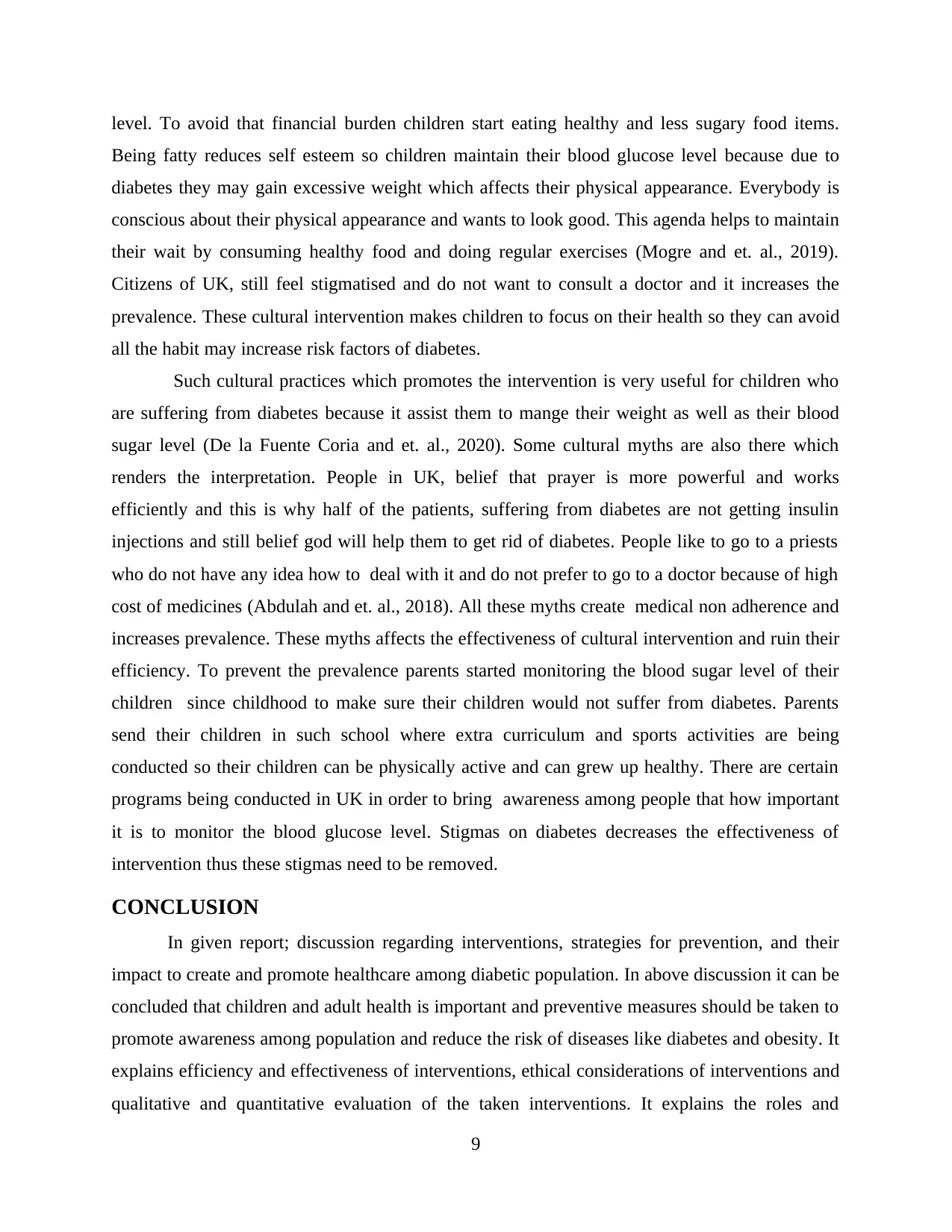
level. To avoid that financial burden children start eating healthy and less sugary food items.
Being fatty reduces self esteem so children maintain their blood glucose level because due to
diabetes they may gain excessive weight which affects their physical appearance. Everybody is
conscious about their physical appearance and wants to look good. This agenda helps to maintain
their wait by consuming healthy food and doing regular exercises (Mogre and et. al., 2019).
Citizens of UK, still feel stigmatised and do not want to consult a doctor and it increases the
prevalence. These cultural intervention makes children to focus on their health so they can avoid
all the habit may increase risk factors of diabetes.
Such cultural practices which promotes the intervention is very useful for children who
are suffering from diabetes because it assist them to mange their weight as well as their blood
sugar level (De la Fuente Coria and et. al., 2020). Some cultural myths are also there which
renders the interpretation. People in UK, belief that prayer is more powerful and works
efficiently and this is why half of the patients, suffering from diabetes are not getting insulin
injections and still belief god will help them to get rid of diabetes. People like to go to a priests
who do not have any idea how to deal with it and do not prefer to go to a doctor because of high
cost of medicines (Abdulah and et. al., 2018). All these myths create medical non adherence and
increases prevalence. These myths affects the effectiveness of cultural intervention and ruin their
efficiency. To prevent the prevalence parents started monitoring the blood sugar level of their
children since childhood to make sure their children would not suffer from diabetes. Parents
send their children in such school where extra curriculum and sports activities are being
conducted so their children can be physically active and can grew up healthy. There are certain
programs being conducted in UK in order to bring awareness among people that how important
it is to monitor the blood glucose level. Stigmas on diabetes decreases the effectiveness of
intervention thus these stigmas need to be removed.
CONCLUSION
In given report; discussion regarding interventions, strategies for prevention, and their
impact to create and promote healthcare among diabetic population. In above discussion it can be
concluded that children and adult health is important and preventive measures should be taken to
promote awareness among population and reduce the risk of diseases like diabetes and obesity. It
explains efficiency and effectiveness of interventions, ethical considerations of interventions and
qualitative and quantitative evaluation of the taken interventions. It explains the roles and
9
Being fatty reduces self esteem so children maintain their blood glucose level because due to
diabetes they may gain excessive weight which affects their physical appearance. Everybody is
conscious about their physical appearance and wants to look good. This agenda helps to maintain
their wait by consuming healthy food and doing regular exercises (Mogre and et. al., 2019).
Citizens of UK, still feel stigmatised and do not want to consult a doctor and it increases the
prevalence. These cultural intervention makes children to focus on their health so they can avoid
all the habit may increase risk factors of diabetes.
Such cultural practices which promotes the intervention is very useful for children who
are suffering from diabetes because it assist them to mange their weight as well as their blood
sugar level (De la Fuente Coria and et. al., 2020). Some cultural myths are also there which
renders the interpretation. People in UK, belief that prayer is more powerful and works
efficiently and this is why half of the patients, suffering from diabetes are not getting insulin
injections and still belief god will help them to get rid of diabetes. People like to go to a priests
who do not have any idea how to deal with it and do not prefer to go to a doctor because of high
cost of medicines (Abdulah and et. al., 2018). All these myths create medical non adherence and
increases prevalence. These myths affects the effectiveness of cultural intervention and ruin their
efficiency. To prevent the prevalence parents started monitoring the blood sugar level of their
children since childhood to make sure their children would not suffer from diabetes. Parents
send their children in such school where extra curriculum and sports activities are being
conducted so their children can be physically active and can grew up healthy. There are certain
programs being conducted in UK in order to bring awareness among people that how important
it is to monitor the blood glucose level. Stigmas on diabetes decreases the effectiveness of
intervention thus these stigmas need to be removed.
CONCLUSION
In given report; discussion regarding interventions, strategies for prevention, and their
impact to create and promote healthcare among diabetic population. In above discussion it can be
concluded that children and adult health is important and preventive measures should be taken to
promote awareness among population and reduce the risk of diseases like diabetes and obesity. It
explains efficiency and effectiveness of interventions, ethical considerations of interventions and
qualitative and quantitative evaluation of the taken interventions. It explains the roles and
9

responsibilities of service providers deals with the diabetic patients and importance of team work
and governmental and non governmental policies to spread awareness among population and
promote them towards healthy eating habits and healthy lifestyle.
10
and governmental and non governmental policies to spread awareness among population and
promote them towards healthy eating habits and healthy lifestyle.
10
⊘ This is a preview!⊘
Do you want full access?
Subscribe today to unlock all pages.

Trusted by 1+ million students worldwide
1 out of 15
Related Documents
Your All-in-One AI-Powered Toolkit for Academic Success.
+13062052269
info@desklib.com
Available 24*7 on WhatsApp / Email
![[object Object]](/_next/static/media/star-bottom.7253800d.svg)
Unlock your academic potential
Copyright © 2020–2026 A2Z Services. All Rights Reserved. Developed and managed by ZUCOL.





